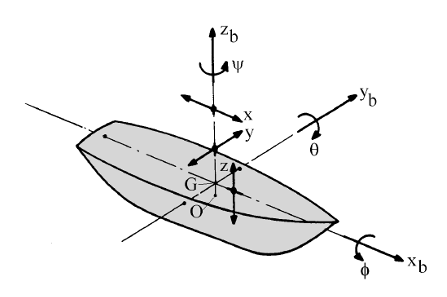Configuration Comparison Catenary Spread Mooring Line On The Movement Characteristics Of Fpso Ships Using Numerical Analysis
Main Article Content
Abstract
Abstract: FPSO (Floating Storage Production and Offloading) is a floating structure that can be used as a location for production, storage or offloading of offshore oil and gas. Therefore, FPSO plays an important role in the exploration of oil fields in the deep sea. When operating, the FPSO will be exposed to environmental loads that can cause it to operate flexibly. To reduce movement response and maintain the FPSO in position, a mooring system is needed. The aim of this research is to analyze the numerical results of this experiment to find RAO (Response Amplitude Operator) free movement (free floating) as well as motion trajectory (surge & sway), motion characteristics, mooring line stress based on variations in the number of ropes used when moored with the direction of loading (heading) from different directions with time domain 250 seconds for each identification. This comparison analysis uses software Boundary Element Method (BEM) with data on FPSO dimensions, type of rope and mooring system, as well as environmental loads that influence the movement of the FPSO structure. The results of the analysis obtained show that in essence the use of the number of mooring lines will greatly influence the movement characteristics, the trajectory/flow of the floating structure and the tension of the mooring ropes. Where, the fewer the number of ropes used, the greater the movement and tension of the resulting rope and vice versa. Usually due to the mass of mooring line which is influenced by the number of ropes not being the same or smaller than displacement FPSO and is also influenced by environmental forces or loads which have repeated patterns over a certain time so that the amount used mooring line must also consider all aspects of the environment in its planning.
Downloads
Article Details

This work is licensed under a Creative Commons Attribution 4.0 International License.
References
R.A. Prasiwi, I. Rochani, dan J.J. Soedjono, “Analisis Perilaku FPSO (Floating Production Storage and Offloading) Terhadap Internal Turret Mooring System Berbasis Simulasi Time Domain”, Jurnal Sains Dan Seni Pomits Vol. 3, No.2, 2013.
B.S. Prasodjo, W.D. Aristanto, dan D.F. Ashyar, “Study Optimasi Panjang Mooring Line Tipe Spread Mooring pada F(P)SO”, Jurnal Wave, UPT. BPPH – BPPT Vol. 5, No. 1, hal. 13-19, 2011.
Sahlan, Arifin, dan Wibowo H.N, “Kajian Numerik Respon Gerakan Kapal Fpso/Fso Saat Ditambat (Moored Fpso/Fso)”, UPT Balai Pengkajian dan Penelitian Hidrodinamika-BPPT, 2012.
Arifin, “Numerically Study of Instability Moored FPSO in Damage Condition with Different Mooring Line Configuration”, UPT Balai Pengkajian dan Penelitian Hidrodinamika-BPPT, hal. 49-53, 2015.
A. Fauzan, H.Yudo, M. Iqbal, “Analisa Kekuatan Spread Mooring Pada Sistem Tambat FDPSO Berbentuk Silinder Di Perairan Lepas Pantai Barat Natuna-Indonesia Menggunakan FEM”, Jurnal Teknik Perkapalan – Vol.4, no.3, 2016.
F.M. Assidiq, D. Paroka, M.Z.M. Alie, dan S. Klara, “Fatigue Analysis of Catenary Mooring System Due to Harsh Enviromental in Head Seas”, EPI International Journal of Engineering, Vol. 1, hal. 30-38, 2018.
Journee, J., & Massie, W., “Offshore Hydromechanics (1st ed.)”. Delft: TU Delft., 2001.
A.Syarifuddin, E.Arianti, R.D. Yulfiani, F.M. Noor, A.L.A. Risdianto, dan M. Mustain, “Pengaruh Konfigurasi Sudut Sebar Dan Panjang Tali Terhadap Kinerja Sistem Tambat Kapal Isap Produksi Timah”, Wave: Jurnal Ilmiah Teknologi Maritim, Vol 5 no.2, hal 61-74, 2021.
I.Y. Ishaq, “Studi Analitis, Numeris Dan Ekperimen Olah Gerak Serta Dinamika Tegangan Sistem Tambat Model Spar Tipe Klasik Dalam Kondisi Free Floating Dan Tertambat Dengan Variasi Konfigurasi Tali (Taut, Catenary 1 Dan Catenary 2)”, Fakultas Teknologi Kelautan, Institut Teknologi Sepuluh November, 2017.
Djatmiko, E. B., Perilaku dan Operablitas Bangunan Laut di Atas Gelombang Acak. 1st ed. Surabaya: ITS Press. 2012.
H.A. Asmajuna, Murdjito, E.B. Djatmiko, “Analysis on the Effect of Catenary Spread Mooring Configuration on the Operability of Subsea Pipeline Installation”, Jurnal Wave Vol. 13 Nomor 2, hal. 47-60, 2019.
S. Yuwantoro, A.F. Zakki, dan H. Yudo, “Analisa Kekuatan Penerapan Sandwich Plate System (SPS) Pada Tank Deck Kapal Landing Ship Tank (LST) 7000 Dwt”, Jurnal Teknik Perkapalan, Vol. 7, hal. 421, 2019.
API RP 2SK, “Design and Analysis of Station Keeping Systems for Floating Structures”, Washington DC, American Petroleum Institute, 2005.

